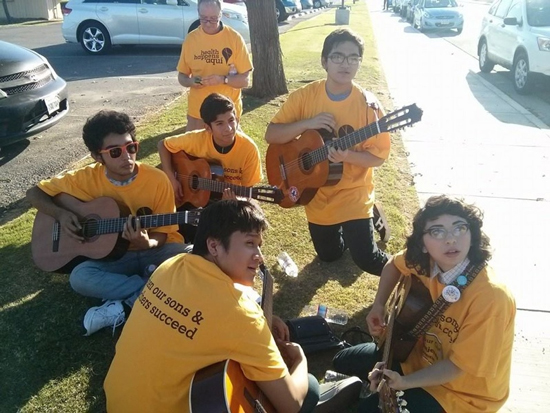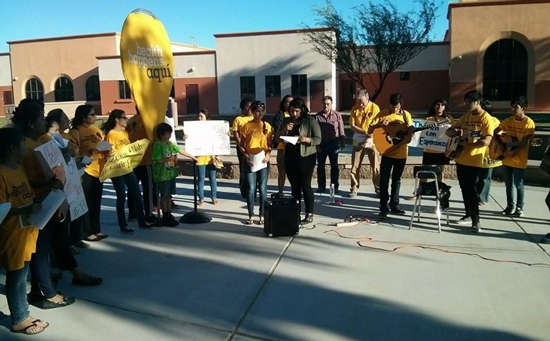 The California Endowment’s Building Healthy Communities (BHC) initiative to enhance community connectedness and healing through engagement in shared cultural practices. We recognize that embedded in these cultural practices are mechanisms for building community, raising community concerns, and further developing plans of action at the neighborhood level. In the Eastern Coachella Valley, ACTA is now launching The Cultural Treasures Beacons for Engaging Community Health Dialogues Project. This effort will coordinate numerous “house gatherings” at local trailer parks, convening residents to learn about local traditional cultural practices under the guidance of local resident artists, while at the same time using the convivial space to engage in dialogue surrounding the pressing policy issues being approached by local Building Healthy Communities “Action Teams,” or partnerships of local BHC partners dedicated to establishing healthier communities in the Eastern Coachella Valley.
The California Endowment’s Building Healthy Communities (BHC) initiative to enhance community connectedness and healing through engagement in shared cultural practices. We recognize that embedded in these cultural practices are mechanisms for building community, raising community concerns, and further developing plans of action at the neighborhood level. In the Eastern Coachella Valley, ACTA is now launching The Cultural Treasures Beacons for Engaging Community Health Dialogues Project. This effort will coordinate numerous “house gatherings” at local trailer parks, convening residents to learn about local traditional cultural practices under the guidance of local resident artists, while at the same time using the convivial space to engage in dialogue surrounding the pressing policy issues being approached by local Building Healthy Communities “Action Teams,” or partnerships of local BHC partners dedicated to establishing healthier communities in the Eastern Coachella Valley.
In preparation, ACTA recently gathered local residents, BHC Partners, and Eastern Coachella Valley youth to model a house gathering and invited Martha Gonzalez, lead vocalist, composer, and percussionist from the Chicano rock band Quetzal, to share her personal cultural practice and collective song-writing process. During her visit to the Valley, Martha facilitated dialogue among participants surrounding the Local Control Funding Formula (LCFF), a new California educational initiative that aims to increase funding, flexibility, and accountability in underserved school districts. Gonzalez incorporated her song-creation process into this conversation, resulting in the creation of Ikáran Ka Erókuarin, a song with verses in both Spanish and Purépecha, an indigenous language of Michoacán, Mexico. Ikáran Ka Erókuarin presents the hope for a brighter educational future through the LCFF initiative and reflects the importance of including the voices of the Valley’s large Purépecha population in these educational discussions. Following this house gathering, local youth performed and sang the song at a press conference prior to a key district vote regarding the allocation of funding through the initiative.
 “cultural assets mapping” process, in which “cultural treasures” of the Eastern Coachella Valley were identified by local residents. A “cultural treasure” is defined as a person, place, or thing community members find to be of cultural value and relevance. In Boyle Heights, community members identified such cultural treasures as the First Street Bridge, Son Jarocho music, and local musicians, Cesar Castro and Gloria Estrada as culturally relevant. In the Eastern Coachella Valley, community members identified such cultural treasures as a local reboso-maker from Oaxaca, Silvia Santiago, and Folklorico Instructor Virginia Ortega, among many others.
“cultural assets mapping” process, in which “cultural treasures” of the Eastern Coachella Valley were identified by local residents. A “cultural treasure” is defined as a person, place, or thing community members find to be of cultural value and relevance. In Boyle Heights, community members identified such cultural treasures as the First Street Bridge, Son Jarocho music, and local musicians, Cesar Castro and Gloria Estrada as culturally relevant. In the Eastern Coachella Valley, community members identified such cultural treasures as a local reboso-maker from Oaxaca, Silvia Santiago, and Folklorico Instructor Virginia Ortega, among many others.
Furthermore, throughout the collaborative process there has been a refocusing and cultivation of a shift in narrative to ways in which art, culture, and music can serve as foundational practices for community empowerment, personal transformation, and for engaging audiences who may not be drawn to policy discussions and traditional community meetings. “It’s not necessarily about the end product that results from cultural or musical exposure, it’s about the introspective artistic process community residents engage with, the personal transformation, the people they meet, the local issues they learn about while on this journey,” explained Quetzal Flores, ACTA’s Southern California Program Manager. In designing community health projects, ACTA finds that arts and cultural practice can serve as an entry way for community members to become more aware of the existing Building Healthy Communities initiatives, while at the same time deepening the connection and preserving traditional arts within communities. Amy Kitchener, ACTA’s founding Executive Director, reflects that, “We’re finding that engaging the traditional arts that are a part of people’s everyday experience of beauty and identity is a powerful entry point for addressing large-scale community health issues, like the spiraling dropout rates we see statewide.”
Kitchener continues, “Through hands on artistic participation, community residents can engage from a place of strength and resilience, and through the process of artmaking, they focus on the deep connection on the issues that require the whole community to work to change.”
To learn more about the house gatherings in Eastern Coachella Valley or other Building Healthy Community activities facilitated by ACTA, contact Southern California Program Manager Quetzal Flores via email or Project Coordinator Citlalli Chavez via email.
